Princeton in the Great War: Hobey Baker ’14
Lieutenant Commander Henry van Dyke ’73, U.S.N.R.
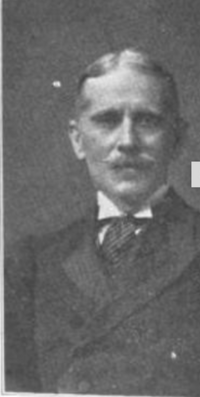
His admiring fellow alumni will be much interested to learn that Dr. Henry van Dyke ’73, lately United States Minister to the Hague and Louxemburg, has been commissioned a Chaplain in the United States Naval Reserve, with the rank of Lieutenant Commander. For the present he will speak at naval cantonments throughout the country and on board ships of the Navy; he hopes later to be assigned to a ship for sea service. It is characteristic of Dr. van Dyke that, with just about all the honors this life can bestow, he should have given new proof of his patriotism by offering his services to his country in this time of need.
The Death of Lieutenant C.B. Ten Eyck ‘17
ANOTHER Princeton man has died in war service, we record with deep regret. Lieutenant Cabell Breckinridge Ten Eyck ’17 died at Douglas, Ariz., on Jan. 10, of pneumonia. He attended the Officers’ Training Camp at Plattsburg and was commissioned Second Lieutenant in the Regular Army. He was first sent to Vermont and later to Douglas, Ariz., where he was in service with the 11th Regiment, Field Artillery.
Lieutenant Ten Eyck was born in Dobbs Ferry, N.Y., August 28, 1895, the son of John C. Ten Eyck ’75 and Laura Breckinridge. He prepared for college at Lawrenceville. His fellow alumni will join in expressing sincere sympathy to his parents in their great bereavement.
DECORATION FOR BENJAMIN STUART WALCOTT ‘17
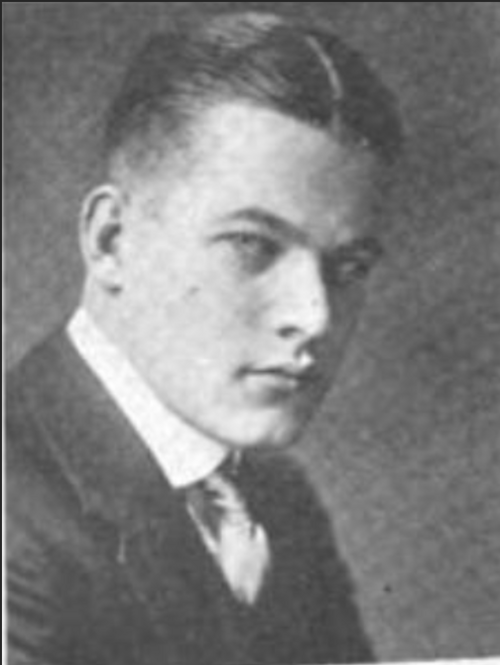
DISPATCHES from the French front, Jan. 11, report that the Croix de Guerre has been awarded to Lieutenant Benjamin Stuart Walcott ’17, who fell behind the German lines Dec. 12, and concerning whose fate no official news has as yet been received. Unofficial reports leave little hope that he is still alive. The medal was received on his behalf by members of his squadron and will be sent to his father, Dr. Charles D. Walcott, Secretary of the Smithsonian Institution at Washington. Following is the citation accompanying the medal:
“Lieutenant Walcott, an American who volunteered for the duration of the war, and a young pilot of admirable spirit and courage, on Dec. 12, 1917, attacked an enemy airplane. He pursued it four kilometers behind the German lines, where he brought it down. He was in turn attacked by three other monoplanes, and was driven down.”
Lieutenant Walcott had been at the front only a few weeks when the flight took place. He was regarded as an excellent pilot.
Corporal Eric A. Fowler ‘19
THE death of Corporal Eric Alexander Fowler ’19 of the Aviation Corps, previously reported in these columns, was due to an accident to his machine while in training at the Flying School at Pau, France. He was buried at Pau on Nov. 28 with full military honors, the Commandant of the School and the Mayor of the town making addresses. Following is a translation of the address by the Commandant, Captain d’Orgeaix:
“We have met together for the third time, to escort one of our American comrades to his last resting place. It is with deep feeling that I come, for the last time, to salute his memory.
“Corporal Fowler was a young man of twenty-two, of a most generous nature and a soul that was as French as ours. At the beginning of the war he offered us his services and for over a year cared for our wounded in one of the American Ambulances. When the United States at last sided with us, he immediately offered to do his duty as a soldier.
“Elated by the stories of prowess shown by our air pilots, Fowler enlisted in the Foreign Legion and chose aviation. He went through the training period without mishap and was attaining his end, when his career and wonderful hopes were suddenly cut short.
At most unfortunate, nay, stupid accident happened, as alas, our country has already counted so many. This clever, courageous and energetic pilot was to have left us soon to go to the front, when he was suddenly taken from us.
“Corporal Fowler, we all mourn your loss; we who admired your fine spirit and youthful enthusiasm, which had so captivated us. We had built such great hopes on your part.
“You do not have the halo of a soldier who has died on the battlefield, but by giving your life, even before having actually fought in the air, you also have done your duty. Your death is non the less glorious.
“And we, your French comrades, as we daily see and admire the splendid spirit which you and your American friends show among us, feel our eyes moisten and our heart grip in our bosom. Your death will not have been useless; it shall serve to unite us closer to the great United States.
“You died for us, among us, and our pilots will all want to avenge your death.
“I believe myself the interpreter of all by extending to the unfortunate family of Corporal Fowler our most heartfelt sympathies.
“Fowler died as a hero. His memory will always remain alive in the hearts of all who knew and admired him.
“Corporal Fowler, in the name of all your comrades, and in the name of the School of Pau, FAREWELL.”
“NET” POE ’97, CHAMPION BOXER
Lieutenant Neilson Poe ’97 of the American Expeditionary Force in France has won another championship. Though admitting his “two score years and some,” he went into an officers’ boxing tournament and came our winner in the 145-pound class. He didn’t suspect that this would be printed here when he wrote it for the entertainment of his home friends, in a lively letter to Winfield S. Kimball ’90, Halsey Durand ’91, and Archibald A. Gulick ’97. For their entertainment also he sent over two cartoons from the Blightly Summer Number, a newspaper published by the soldiers “over there.” One of the pictures shows a rotund soldier rushing ahead of his company, while his sergeant warns him not to be in such a hurry, for “if they collar you they’ll have enough fat to last the way out.” The other picture, representing “War in the Stone Age,” must have been suggested to the artist by Lieutenant Poe himself—judging from the description in his letter, which is in part as follows:
“I am sending you two pictures very apropos of the present encounter now going on this side of the water. You may recognize one of the Pats [Durand and Kimball] in one of them, but as I am not saying which one it is, no offence can be taken, but both of you can be amused and laugh over it is your sense of humor is as keen as it used to be. I am the hero of the other and you can see me in the lead. I am not waving my hand to my brave fellows to follow me but am sticking it up to my nose at Aleck [Lieutenant M.S. Wightman ‘04] in the rear, on high safe ground, you may bet, telling them for heaven’s sake to lift their barrage higher, that they are causing me losses. Wire entanglements are represented by cactus in front, aeroplanes by ’99 Sacred Bird and his offspring. The other picture shows that one of you had a perfectly good reason for military exemption.
“Well, my schooling is over at the 4th British Army Infantry School and I am a full-fledged fighting man. There was a boxing tournament the last three days of the course and still feeling young and husky at the age of two score and some more, I entered into the 10-stone-5 class. Each bout limited to three rounds of a minute each. We were promised that the referee would stop all rough stuff. How he kept his promise is shown in the list of casualties, one broken nose, gotten by an English Graelite, eight black eyes, bloody noses galore and a few swollen lips, but still the bouts went on and Tommy Atkins cried, let the good fights go on. Of course I wouldn’t have mentioned all these fights if I wasn’t going to be the hero. In other words I won in my class and received a medal at the hands of the General of the 4th British Army. Luckily it wasn’t a French General or I might have been kissed. I beat up a Scotchman, an Englishman and a brother American. The American officers won five out of the six classes, so we have some standing with them now. One of our officers used to be an enlisted man in our Navy and none of his fights lasted a round. This is the first time I have fought since I saved Pardee from the brutal attack of the Yale man….
“I had a great trip over part of the Somme battlefield. That section is now fairly quiet and they sent all the American officers up there to see what life in the trenches is like. The Caveman had nothing on this life. When you once get in a trench you are not apt to see anything but mud and sky. The inclination to look over into ‘Bochland’ isn’t hard to resist. Vertical looking is the chief occupation of the day, for ‘Whizzbangs’ come most unexpectedly and ‘Minniewerfers’ have no regard for the trenches. The latter go high up in the air and can be seen, and you can dodge them if you don’t act like a chicken getting out of the way of an automobile; but how they do blow up a trench when they land! Of the ‘Whizzbang’ you hear both the whizz and the bang at the same moment and it is too late to dodge.
“That part of France that the Boche retreated over is most desolate. The Hun is very thorough. There were any number of small villages that he retreated through and not a house with a roof or four walls is standing; everything dynamited. All fruit trees lying on the ground and big, beautiful trees alongside the road all cut down to block the advance of the British.
“When a battalion goes into the trenches it means that they wear their clothes all the time they are there. In the front trench boots are not taken off but in the support and reserve trenches a few hundred yards back they are removed. You can well imagine what condition the men are in when they come out. Water for washing is gotten from shell holes and there is no lack of them, but it isn’t Eau de Cologne. Water for drinking and cooking is hauled up. The dugouts in the front line are thirty feet deep and pretty safe from shell fire. I spent part of each day in the front trench and one day both sides started a small bombardment, just to put the 'wind up' each other. Each size shell has a different sound and you catch on to what size shell is flying over. Of course it was music to my ears and the shells varied from tenor to bass. The 'Flying Pig' is a British shell and 1 hope many of them will fall on the German Pigs. They are somewhat like the ‘Minnies’ and raise hell with the trenches. One part of the front line is only twenty-five yards from the German trench, and that was the nearest I got to the Hun. The mud is something awful and you soon get caked with it. The bottom of the trenches are lined with a small board walk or ‘duck board,’ as they are called, raised a foot from the bottom of the trench, and they are therefore dry. You can’t imagine what amount of work it is to dig these trenches and the material used for riveting. Corrugated iron, chicken wire, thousands of sand-bags, boards, and anything else that will keep the sides from caving in. I don’t know what I am going to do. I leave here tomorrow for our headquarters ‘Somewhere in France’ and will find out there. I am beginning to think that it is a long, long trail winding between thee and me.”
HOBEY BAKER’S FIRST HUNBIRD
A dispatch from Paris reports that Lieutenant Hobart A. H. Baker ’14 of the American Flying Corps in France brought down his first German airplane on Jan. 5. This latest achievement by the former Princeton football and hockey captain has inspired the following in “Tom Daly’s Column” in the Evening Ledger of Philadelphia,—Lieutenant Bakers former home:
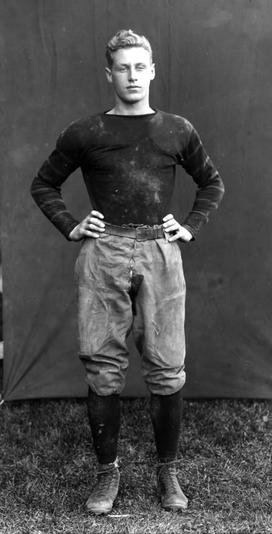
HOBEY BAKER, QUAKER
“ ‘Hobey Baker,’ of your town,”
Sing the wires undersea,
“Adds to his and your renown’
Brings his first Boche airplane down,
Glory Be!
“Let the Bell o’ Freedom swing,”
Sing the wires under the sea,
“Make the Quaker welkin ring.”
Here’s a rouse then! Let us sing
Hobey B:
Here’s to Hobey Baker,
By the grace o ‘God a Quaker,
But by every red cor-puscle,
Every sinew, every muscle,
A most eager and most potent son of
Mars.
He's a bear; a trouble-maker,
He was born a record-breaker:
And the world has heard the story
Of his fledging bid for glory,
In the playboy pranks of Princeton,
star or stars.
But he figures now as a shaker
Of the crude Teutonic faker,
And our champion at hockey,
As a wild, aerial jockey
Rides a tilt against the Teuton’s winged
cars;
And the first to brave our Quaker
Finds his billet in God’s acre!
Heaven bless you, bone and sinew:
May your brave plume long continue
In the forefront of the airy ranks of Mars,
Hobey Baker!
MEN WANTED BY ORDNANCE DEPARTMENT
Captain L. H. Van Dusen ’98, Ordinance Reserve Corps, who is stationed in Washington with the Ordnance Civilian Personnel Division, has sent a letter to deans of technical schools requesting their cooperation in recruiting men who are technically trained. We quote the following:
“The Ordnance Department of the War Department needs men with mechanical and technical training which would equip them to fill capably important positions in the various ordnance establishments. This need is so vital and pressing that the Civilian Personnel Division feels justified in appealing to you for assistance and cooperation in obtaining the necessary employes. In your acquaintance, or among the alumni of your institution, there are men well fitted to serve the government as mechanical engineers, mechanical draftsmen, engineers and electricians. Will you kindly suggest to us the names of persons capable to fill such positions, together with a brief memorandum of their experience or qualifications? We will then communicate with them, advising them as to the requirements of the positions which they might be able to fill, and also giving them proper information as to the Civil Service regulations. Applicants should write for information to civilian Personnel Division, 1333 F Street, N. W., Washington, D.C.
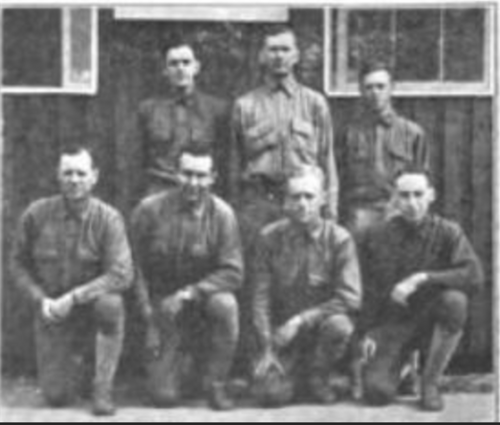
“The Ordnance Department has a great demand also for clerical assistance—stenographers, typists, schedule clerks, qualified in statistics or accounting and clerks for general work. This need is increasing and continuing.
“As the Department is charged with the great responsibility of supplying all munitions for our soldiers, anything that you can do to assist in obtaining the required quota of employes will be in the nature of a distinct contribution toward bringing about the speedy and successful conclusion of the war.
SQUADRON A OF NEW YORK
Princetonians living in New York and vicinity will be interested in the following notice concerning Squadron A, Cavalry, of the New York Guard, with which many Princeton men have been associated:
“Depot Squadron A, N. G., N. Y., composed mainly of ex-members of Squadron A. is to be mustered into the new State Guard. Additional members are desired, especially from the ranks of college graduates.
“Opportunity is thus afforded to men who by reason of dependents or other cause are not free to enter the federal forces, but wish to render some military services.
“Applications and communications may be addressed to the Chairman of the Membership Committee, W. B. De Haven, 40 Wall St., New York City.”
This was originally published in the January 16, 1918 issue of PAW.


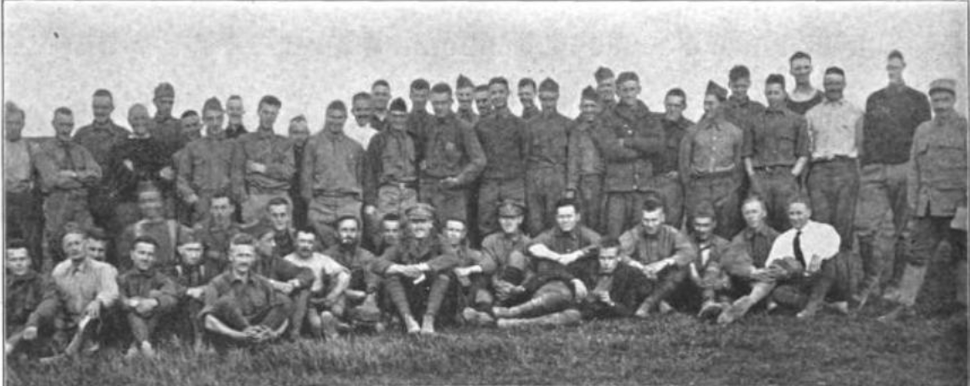









No responses yet